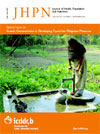
|
The Journal of Health, Population and Nutrition
icddr,b
ISSN: 1606-0997
EISSN: 1606-0997
Vol. 24, No. 1, 2006, pp. 107-112
|
 Bioline Code: hn06015
Bioline Code: hn06015
Full paper language: English
Document type: Research Article
Document available free of charge
|
|
|
The Journal of Health, Population and Nutrition, Vol. 24, No. 1, 2006, pp. 107-112
| en |
Standard WHO-ORS Versus Reduced-osmolarity ORS in the Management of Cholera Patients
Pulungsih, Sri Pandam; Punjabi, Narain H.; Rafli, Kustedy; Rifajati, Atti; Kumala, Swiandy; Simanjuntak, Cyrus H.; Yuwono; Lesmana, Murad; Subekti, Decy; Sutoto & Fontaine, Olivier
Abstract
The study compared the safety and efficacy of an oral rehydration salts (ORS) solution, containing 75 mmol/L of sodium and glucose each, with the standard World Health Organization (WHO)-ORS solution in the management of ongoing fluid losses, after initial intravenous rehydration to correct dehydration. The study was conducted among patients aged 12-60 years hospitalized with diarrhoea due to cholera. One hundred seventy-six patients who were hospitalized with acute diarrhoea and signs of severe dehydration were rehydrated intravenously and then randomly assigned to receive either standard ORS solution (311 mmol/L) or reduced-osmolarity ORS solution (245 mmol/L). Intakes and outputs were measured every six hours until the cessation of diarrhoea. During maintenance therapy, stool output, intake of ORS solution, duration of diarrhoea, and the need for unscheduled administration of intravenous fluids were similar in the two treatment groups. The type of ORS solution that the patients received did not affect the mean serum sodium concentration at 24 hours after randomization and the relative risk of development of hyponatraemia. However, patients treated with reduced-osmolarity ORS solution had a significantly lower volume of vomiting and significantly higher urine output than those treated with standard WHO-ORS solution. Reduced-osmolarity ORS solution was as efficacious as standard WHO-ORS solution in the management of cholera patients. The results indicate that reduced-osmolarity ORS solution is also as safe as standard WHO-ORS solution. However, because of the limited sample size in the study, the results will have to be confirmed in trials, involving a larger number of patients.
Keywords
Diarrhoea; Cholera; Oral rehydration solutions; Rehydration; Dehydration; Osmolar concentration; Randomized controlled trials; Double-blind method; Comparative studies; Indonesia
|
| |
© Copyright 2006 - ICDDR,B: Centre for Health and Population Research
Alternative site location: http://www.jhpn.net
|
|
